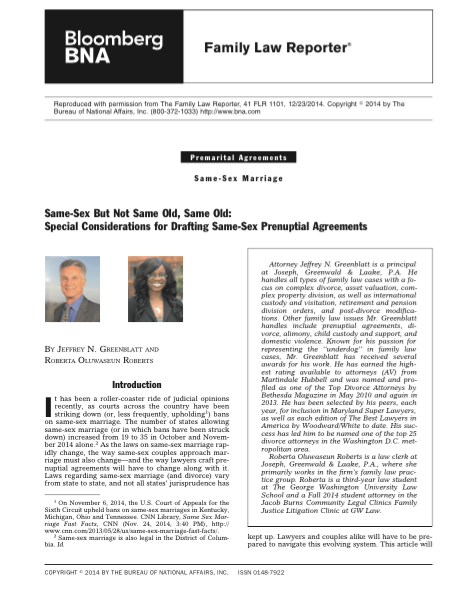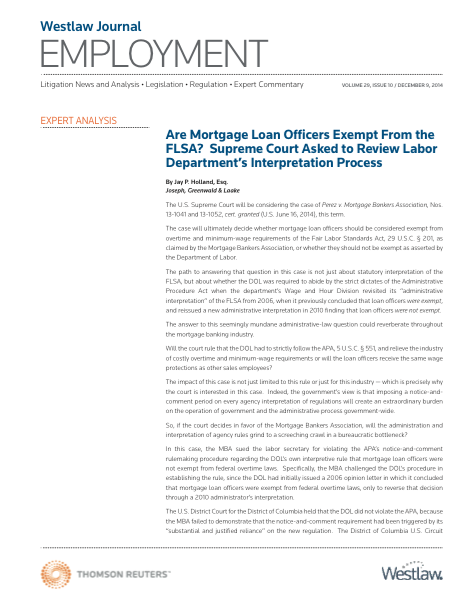Law360, New York — In a tight job market, many students turn to unpaid internships to get their feet in the business door and gain real-world job experience for light resumes. At first blush, it seems like a fine concept: the student gains much-needed resume filler and makes networking connections while the employer enjoys free labor. In a weak economy with lean company budgets and fierce job competition, this is a win-win situation, right?
Not so, according to some federal courts and the U.S. Department of Labor.
Simply put, employees cannot contract away minimum wage laws. Scores of interns are now suing — and winning — back pay for unpaid internships. Rocking some big name employers, many of these lawsuits also reach back six years. The basics of the DOL six-part intern test can be found here. This article expands on that, outlines the arguments on both sides in some recent cases and provides a checklist of considerations for employers who have or are thinking of starting internship programs.
Recent Cases Result in Million-Dollar Settlements or Immediate Appeals
Mushrooming in 2013, groups of former unpaid interns banded together in record numbers to sue former employers for failing to pay minimum wages during their unpaid internships. Among the headline grabbers have been lawsuits against such giants as Conde Nast Publications, Atlantic Recording Corp., Fox Searchlight Pictures Inc., NBC Universal Media Inc., Viacom Inc., Sony Corp.,Donna Karan and Charlie Rose.
The latest big company to settle a lawsuit over unpaid internships is NBC, which, according to a court filing on Oct. 22, settled a purported class action brought by unpaid interns who worked for SaturdayNight Live.[1] If the settlement gets approved, NBC will pay $6.4 million to more than 8,000 interns reaching back to 2007. (Deadline.com obtained a copy of the SNL settlement memorandum and posted it publicly here.) It is estimated the proposed settlement would pay $500 per intern, though payments to the named plaintiffs will range from $2,000 to $10,000 each.
How can an intern who reaped the benefit of working for an iconic TV show like SNL sue for back pay for an internship he or she agreed would be unpaid? It all has to do with the Fair Labor Standards Act and state equivalents, which require employers to pay minimum wages to those whom they “employ,” regardless of any agreement to the contrary. These laws were enacted to protect unwitting employees from being taken advantage of on the often-unequal playing field of employer-employee relationships.
For decades, these workers were not classified by employers as “employees,” but instead as nonemployee “unpaid interns” given their student or in-training status. But, groups of these interns are now crying foul and courts are disagreeing with the long-held employer classification. This has resulted in some very public million-dollar settlements paid out by big employers such as NBC.
The FLSA defines the term “employ” very broadly as “to suffer or permit to work.”[2] More often, courts are ruling against employers in cases like that against Fox Searchlight. Unlike NBC and most others, Fox is one of the few employers that is litigating the issue instead of settling. There, the unpaid and underpaid interns from mega movies “Black Swan” and “500 Days of Summer” sued for back pay.[3]
The interns based their case on the FLSA’s expansive definition of “employ”[4] and highlighted the measure of control exerted by Fox Searchlight. They also claimed that they did not fit the narrow exception for “trainees” carved out by the U.S. Supreme Court in Walling v. Portland Terminal Co., 330 U.S. 148 (1947). Walling forged a narrow path of exception for true trainees. This exception is limited to cases in which the employer offers “the same kind of instruction” offered by a vocational school, the employer receives no “immediate advantage” from the work performed by the trainees, the trainees work “solely for [their own] personal purpose or pleasure” and their “work serves only [their] own interest.”[5]
The plaintiffs also cited public policy concerns, including that an intern should not be able to simply waive the FLSA. “If an exception to the Act were carved out for employees willing to testify that they performed work ‘voluntarily,’ employers might be able to use superior bargaining power to coerce employees to make such assertions, or to waive their protections under the Act.”[6]
Trying to refocus the court, Fox Searchlight argued that it was removed from the intern process and did not “employ” them. Instead, Fox Searchlight contracted with other entities to produce the movies and it was those producers that hired the interns — before Fox Searchlight was even involved — and did not have signed agreements with the named plaintiffs. Fox Searchlight touted the Supreme Court’s instruction that for purposes of the FLSA, a determination that an employee-employer relationship exists must be grounded in “economic reality.”[7] Searchlight argued that the “economic reality” of its situation was that it was merely a “business partner” with the producer and a “cofinancier,” but not a joint employer. The court rejected these arguments.
On June 11, 2013, Judge William Pauley of the U.S. District Court for the Southern District of New York sided with the interns. He granted partial summary judgment for the plaintiffs and also granted class certification.[8] Judge Pauley focused on control. “When it comes to ‘employer’ status under the FLSA, control is key.”[9] While the defendant employers argued that Fox Searchlight had the right to fire employees “only if certain conditions were met,” the court noted that it retained the right to require its production partner to fire any worker at Fox Searchlight’s “sole reasonable discretion.” Moreover, the court noted that “[c]ontrol may be restricted, or exercised only occasionally, without removing the employment relationship from the protections of the FLSA, since such limitations on control do not diminish the significance of its existence.”[10]
This ruling is now on appeal awaiting oral argument and then a decision from the Second Circuit in what is sure to be a much-discussed opinion. Noting the importance, amici curiae have poured in supporting both sides, including the U.S. Chamber of Commerce, National Employment Lawyers Association and Secretary of Labor.
Another unpaid intern case, siding this time with the employer, is also on appeal in the Second Circuit. In Xuedan Wang v. Hearst Corp., 293 F.R.D. 489, 494 (S.D.N.Y. 2013), the district court denied the plaintiffs’ motion for summary judgment and class certification. In a brief opinion, it noted that the employer had shown “some educational training, some benefit to individual interns, some supervision, and some impediment to Hearst’s regular operations,”[11] such that material facts were in dispute. Like the court in Searchlight, the Xuedan court also granted an immediate appeal. Interested parties will keep their eyes on the Second Circuit for these opinions.
A Roadmap for Prudent Employment Lawyers and In-House Counsel
What advice should be given to the concerned employer? Aside from researching your client’s state-specific employment laws, employment lawyers must start with the DOL website and its fact sheets. The DOL fact sheet on unpaid internships lays out a six-part test[12] for determining whether an internship meets the exclusion for minimum wage payment. This document is a must-have starting point for any discussion with your client about internships.
The crux of the DOL test, some of it taken from Walling, is that an internship must truly be for training and educational purposes. At its core, if an internship is for the benefit of the intern — and the employer derives no immediate benefit from it — the internship probably qualifies for the exclusion.
Prudent in-house counsel and employment attorneys will not only brush up on the DOL six-part test, but will also carefully review the recent opinions in Fox Searchlight and other cases.[13] A review of the Searchlight opinion coupled with Walling reveals a basic checklist of areas that should be covered with any client reviewing or considering an internship program. This includes consideration of whether:
- the employer has hiring and firing power;
- the employer can supervise or control work schedules or conditions;
- the employer determines the rate and method of payment;
- the employer retains employment records;
- an employment agreement exists;
- the job offers the same kind of instruction as that offered by a public or private vocational school;
- the employer receives any “immediate advantage” from the work performed; and
- the trainee or intern works solely for his or her own personal purpose and the work serves his or her own interest.
Of note, some states have more stringent laws than the FLSA and some state laws also have different applicable statutes of limitation. The reason almost all of the recent unpaid intern class actions have come out of New York is because that state allows these cases to reach back six years, while the FLSA statute of limitations is only three years.
Employers should beware of all of these issues relating to unpaid internships. Intent does not matter. Even those with the best at heart can run afoul of the wage and payment laws. The most important takeaways from these cases for employers are that: (1) wage laws are not terms that can be contracted away; and (2) the use of another company or buffer will not necessarily shield an employer from the long reach of the FLSA.
A proactive discussion of these factors and the surrounding issues with your clients might just head off a costly multimillion dollar, multiyear class action.
—By Veronica Nannis, Joseph Greenwald & Laake PA
Veronica Nannis is a principal in Joseph Greenwald & Laake’s Greenbelt, Maryland, office.
The opinions expressed are those of the author(s) and do not necessarily reflect the views of the firm, its clients, or Portfolio Media Inc., or any of its or their respective affiliates. This article is for general information purposes and is not intended to be and should not be taken as legal advice.
[1] Monet Eliastam, Alexander Vainer, and Rheanna Behuniak, et al. v. NBC Universal Media LLC, Case 1:13-Cv-04634, in the U.S. District Court for the Southern District of New York.
[2] 29 U.S.C. § 203(g).
[3] Eric Glatt, Alexander Footman, Eden Antalik, and Kanene Gratts, et al. v. Fox Searchlight Pictures Inc., et al., Case 1:11-Cv-06784-WHP-AJP, in the U.S. District Court for the Southern District of New York.
[4] The interns argued that in the FLSA, Congress adopted, “‘the broadest definition [of ‘employ’] that has ever been included in any one act.’” Zheng v. Liberty Apparel Co., 355 F.3d 61, 69 (2003) (quoting U.S. v. Rosenwasser, 323 U.S. 360, 363 n.3 (1945)).
[5] 330 U.S. at 152-53.
[6] Citing Tony & Susan Alamo Found. v. Sec’y of Labor, 471 U.S. 299, 302 (1985).
[7] Citing Goldberg v. Whitaker House Coop. Inc. 366 U.S. 28, 33 (1961).
[8] Judge Pauley’s Memorandum and Order is publicly available athttp://www2.bloomberglaw.com/public/desktop/document/Glatt_et_al_v_Fox_Searchlight_Pictures_Inc_Docket_No_111cv06784_S
[9] Glatt v. Fox Searchlight Pictures Inc., 293 F.R.D. 516, 525 (S.D.N.Y. 2013) on reconsideration in part, No. 11 CIV. 6784 WHP (S.D.N.Y. Aug. 26, 2013) and motion to certify appeal granted, No. 11 CIV. 6784 WHP (S.D.N.Y. Sept. 17, 2013).
[10] Glatt v. Fox Searchlight Pictures Inc., 293 F.R.D. 516, 527 (S.D.N.Y. 2013).
[11] Xuedan Wang v. Hearst Corp., 293 F.R.D. 489, 494 (S.D.N.Y. 2013) (emphasis in original).
[12] The DOL test includes the following factors:
1. the internship, even though it includes actual operation of the facilities of the employer, is similar to training which would be given in an educational environment;
2. the internship experience is for the benefit of the intern;
3. the intern does not displace regular employees, but works under close supervision of existing staff;
4. the employer that provides the training derives no immediate advantage from the activities of the intern; and on occasion its operations may actually be impeded;
5. the intern is not necessarily entitled to a job at the conclusion of the internship; and
6. the employer and the intern understand that the intern is not entitled to wages for the time spent in the internship.
[13] See also numerous recent (though unreported) related opinions, including: Fraticelli v. MSG Holdings LP, No. 13 CIV. 6518 JMF (S.D.N.Y. May 7, 2014) (denying plaintiffs/unpaid interns’ motion for conditional certification); O’Jeda v. Viacom Inc., No. 13 CIV. 5658 JMF (S.D.N.Y. Apr. 4, 2014) (granting plaintiffs/unpaid interns’ motion for conditional certification); Wolfe v. AGV Sports Grp. Inc., No. CIV. CCB-14-1601 (D. Md. Nov. 3, 2014) (denying employer’s motion to dismiss a putative class action brought by unpaid interns).




